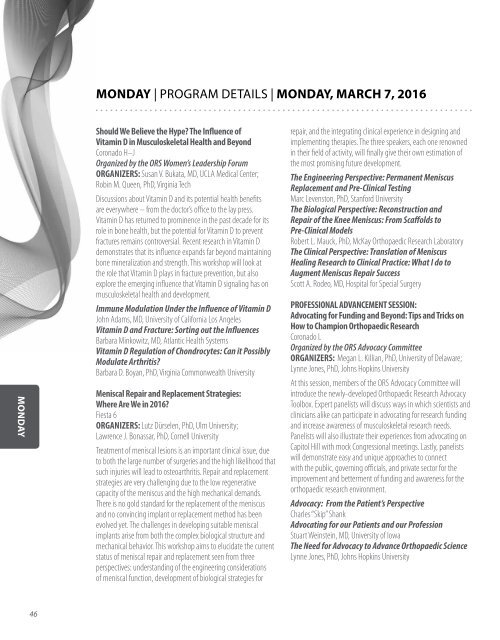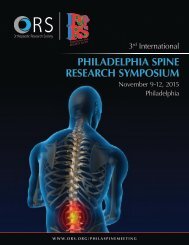PROGRAM BOOK
ORS-2016-PROGRAM-BOOK_FOR_WEB
ORS-2016-PROGRAM-BOOK_FOR_WEB
Create successful ePaper yourself
Turn your PDF publications into a flip-book with our unique Google optimized e-Paper software.
MONDAY | <strong>PROGRAM</strong> DETAILS | MONDAY, MARCH 7, 2016<br />
MONDAY<br />
Should We Believe the Hype? The Influence of<br />
Vitamin D in Musculoskeletal Health and Beyond<br />
Coronado H–J<br />
Organized by the ORS Women’s Leadership Forum<br />
ORGANIZERS: Susan V. Bukata, MD, UCLA Medical Center;<br />
Robin M. Queen, PhD, Virginia Tech<br />
Discussions about Vitamin D and its potential health benefits<br />
are everywhere – from the doctor’s office to the lay press.<br />
Vitamin D has returned to prominence in the past decade for its<br />
role in bone health, but the potential for Vitamin D to prevent<br />
fractures remains controversial. Recent research in Vitamin D<br />
demonstrates that its influence expands far beyond maintaining<br />
bone mineralization and strength. This workshop will look at<br />
the role that Vitamin D plays in fracture prevention, but also<br />
explore the emerging influence that Vitamin D signaling has on<br />
musculoskeletal health and development.<br />
Immune Modulation Under the Influence of Vitamin D<br />
John Adams, MD, University of California Los Angeles<br />
Vitamin D and Fracture: Sorting out the Influences<br />
Barbara Minkowitz, MD, Atlantic Health Systems<br />
Vitamin D Regulation of Chondrocytes: Can it Possibly<br />
Modulate Arthritis?<br />
Barbara D. Boyan, PhD, Virginia Commonwealth University<br />
Meniscal Repair and Replacement Strategies:<br />
Where Are We in 2016?<br />
Fiesta 6<br />
ORGANIZERS: Lutz Dürselen, PhD, Ulm University;<br />
Lawrence J. Bonassar, PhD, Cornell University<br />
Treatment of meniscal lesions is an important clinical issue, due<br />
to both the large number of surgeries and the high likelihood that<br />
such injuries will lead to osteoarthritis. Repair and replacement<br />
strategies are very challenging due to the low regenerative<br />
capacity of the meniscus and the high mechanical demands.<br />
There is no gold standard for the replacement of the meniscus<br />
and no convincing implant or replacement method has been<br />
evolved yet. The challenges in developing suitable meniscal<br />
implants arise from both the complex biological structure and<br />
mechanical behavior. This workshop aims to elucidate the current<br />
status of meniscal repair and replacement seen from three<br />
perspectives: understanding of the engineering considerations<br />
of meniscal function, development of biological strategies for<br />
repair, and the integrating clinical experience in designing and<br />
implementing therapies. The three speakers, each one renowned<br />
in their field of activity, will finally give their own estimation of<br />
the most promising future development.<br />
The Engineering Perspective: Permanent Meniscus<br />
Replacement and Pre-Clinical Testing<br />
Marc Levenston, PhD, Stanford University<br />
The Biological Perspective: Reconstruction and<br />
Repair of the Knee Meniscus: From Scaffolds to<br />
Pre-Clinical Models<br />
Robert L. Mauck, PhD, McKay Orthopaedic Research Laboratory<br />
The Clinical Perspective: Translation of Meniscus<br />
Healing Research to Clinical Practice: What I do to<br />
Augment Meniscus Repair Success<br />
Scott A. Rodeo, MD, Hospital for Special Surgery<br />
PROFESSIONAL ADVANCEMENT SESSION:<br />
Advocating for Funding and Beyond: Tips and Tricks on<br />
How to Champion Orthopaedic Research<br />
Coronado L<br />
Organized by the ORS Advocacy Committee<br />
ORGANIZERS: Megan L. Killian, PhD, University of Delaware;<br />
Lynne Jones, PhD, Johns Hopkins University<br />
At this session, members of the ORS Advocacy Committee will<br />
introduce the newly-developed Orthopaedic Research Advocacy<br />
Toolbox. Expert panelists will discuss ways in which scientists and<br />
clinicians alike can participate in advocating for research funding<br />
and increase awareness of musculoskeletal research needs.<br />
Panelists will also illustrate their experiences from advocating on<br />
Capitol Hill with mock Congressional meetings. Lastly, panelists<br />
will demonstrate easy and unique approaches to connect<br />
with the public, governing officials, and private sector for the<br />
improvement and betterment of funding and awareness for the<br />
orthopaedic research environment.<br />
Advocacy: From the Patient’s Perspective<br />
Charles “Skip” Shank<br />
Advocating for our Patients and our Profession<br />
Stuart Weinstein, MD, University of Iowa<br />
The Need for Advocacy to Advance Orthopaedic Science<br />
Lynne Jones, PhD, Johns Hopkins University<br />
46



